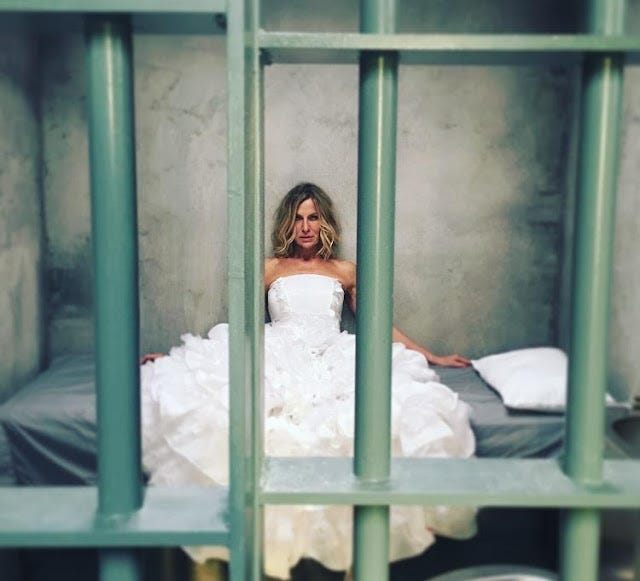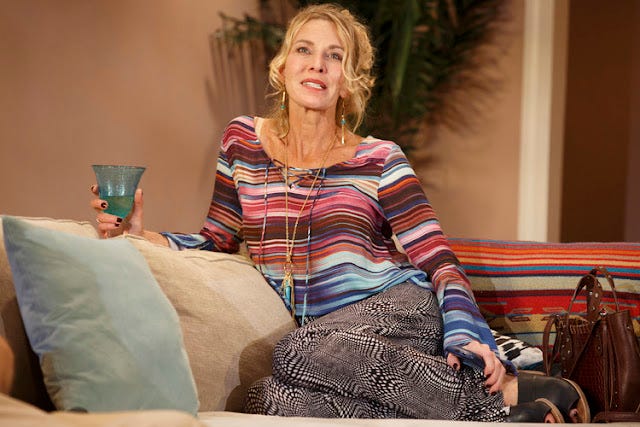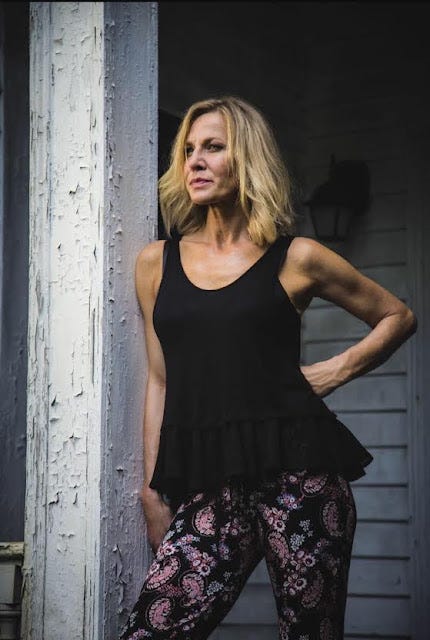Lusia Strus: Jeweled Scimitar, Part One

Lusia Strus as Estelle in TNT's Good Behavior.
Some talents require a warning: Those who are about to partake of a particular actor or director or playwright need to be told that common or moderate expectations are best left at home, where you might want to stay as well. Lusia Strus is such a talent, and while her dedication to a play and a part is fulsome and rigid, the outcome is happily discomfiting. I cannot think of another actress who is like her.
This is, for those slow to pick up on things, a cause for celebration.
I did not know of Lusia Strus and her career, long and lauded, in Chicago theatre, being a member of the Neo Futurists and appearing on stage with Steppenwolf. My introduction to Strus took place here in New York, at Playwrights Horizons, in Dan LeFranc's long, complex, brilliantly funny Rancho Viejo this past December. If you did not see the play, a synopsis is virtually impossible: Let's just say that some couples, of various ages and backgrounds, are biding their time and denying decay of body and soul through various pursuits in a pastel living community in a California town that has the charm of a strip mall. In some moments you hate the characters; in others, you pity and admire them. It was a play that was very much like life, with people doing their best, and often doing it badly. LeFranc managed a marriage that was part Annie Baker and part David Lynch, and I do not know why the play didn't reach more people.
Go know.
Strus was partnered with a black man (the terrific Tyrone Mitchell Henderson), who had color in his pigment, but very little in his soul, although other characters danced around his race at certain points. All of the color belonged to Suzanne, Strus' character, gym-thin, whipped into a gleaming frenzy of macquillage, jewelry, and anger, and suffering from an eye condition that caused the heads of those to whom she attempted conversation to blur or disappear. Kicking her long legs as she walked across the stage, staving off boredom and a fight with her lover, Strus had the beauty of Cate Blanchett, but a Blanchett on meth, and the high was wearing off, and trouble was brewing. Almost all of the characters found themselves in the frightening gaze of Strus, and it is a gaze that creates a path in which you do not want to find yourself without a lot of truth, guts, and humor. Strus and the redoubtable Mare Winningham were the anchors of the play, holding together the entire ensemble, who benefited from Daniel Aukin's liberating direction.

Strus as Suzanne in Dan LeFranc's Rancho Viejo, presented last December at Playwrights Horizons.
After my first viewing of Rancho Viejo, I immediately purchased tickets for a second and wrote to Strus, requesting a meeting. Before she arrived at my apartment one afternoon, I binged her television program Good Behavior (TNT) and was ready for an adventure. I was not denied one. Strus, tall and blonde and perpetually curious, walked into my apartment like Jeanne Moreau in Bay of Angels. She owned the space, but she shared it. I told her that her work and her demeanor seemed to be that of someone who had wasted time, knew time was limited, and was not going to make too many mistakes again. She was running.
I told Strus that she had the feel of someone focused and free. Her work on Good Behavior, which was recently renewed for a second season, was perfectly detailed, always surprising. Just when you think you have her character--Estelle--pegged as a bad mother, white-trash division, she turns a bit and reveals the frightened mother; the abandoned little girl; the victim of chance; a broad who wants to be a lady, and is still walking down various aisles looking for the accessories. The performances have a strong air of style and disciplined recklessness, and I wonder if Strus is happy to have the large audience a series provides.
"The idea of being in a series," she begins. "I mean, I don't wake up and say to myself, I'm on a series, and feel better about myself. I feel better about myself, and about a lot of other things, doing the work on the series. But I'm tough on myself. I don't know if I could give myself an A+ for my work in television, but I have given myself an A- for work in the theatre."
Is there satisfaction? I ask
"I know that I have delivered everything within my grasp," she replies. "I'm learning how to express gratitude for a compliment."
I ask Strus to comment on the characters in Rancho Viejo, whose lives centered entirely around what others thought of them, what others expected of them. Isn't that very much how life for an actor in television can be?
"Yes," she answers immediately, "and the minutiae of how tiny things are a big deal, and becoming upset and invested and angry and resentful about the tiniest things, and spending time getting resentful at someone you don't even know for entering your sphere. And looking to be better than other people. To compete. There is a quote I'm trying to remember..."
Strus pulls out her cellphone and begins to search for an image, finds it, and shows it to me. It is from Salvador Dali, and it reads "The thermometer of success is merely the jealousy of the malcontents."
"I have felt envy," she says, "and I don't think that anything could kill me more. For myself, I have to eradicate it entirely from my life. It's a signal to me that I am discontented. I am a malcontent [when envious] and, therefore, I need to take action with my own life, and I just need to keep my eyes on my own paper. But I have said to friends, I love your work, but I am also having such dark feelings inside myself about you. That's growth and maturity when you can just say it to each other. Guys seem able to do it to each other. I sometimes think that the onus is on the person receiving the good fortune to let the people around him or her feel good as well."
So the television series--a dream of an ensemble cast, great writing, sizzling people--hasn't changed her?
"Nah," she says, standing by the window, smoking a cigarette, killer eyes reflecting the dusky sky. "I've always been the same person I was at thirteen. You know, fuck it. It's going to work out. I just always know that it's going to work out. That's my perspective. Don't compare your insides to someone else's outsides. We just don't know. Or their Facebook page. We curate our lives for other people. We don't know what's going on with people. Envy does not feel good. When people are feeling certain things about me--negative things--I know they're not in a good place, you know? It doesn't feel good to feel envy or criticism. It feels good to feel okay for others, to be happy for others. These infinite things called happiness and money and success. But no matter what we might think about a play or a book, someone sat down and created this, and that's a feat. From an idea that came to them while walking down the street or doing the dishes, and it's now a book. That's something. That's a big deal. So, whatever it is: Holy shit! It's far beyond what I do. I admire workers among workers. I admire people who do stuff. I'm not envious of them. I'm actually now at a point in my life where I want to know how they do it, because I want to be like them."

You can--and should--see what Lusia Strus is up to on Good Behavior. You can stream the entire season, and watch her various colors. She cuts through the part like a jeweled scimitar, but she uses her weapon with skill and delicacy. There is contact and breakage, but there is also beauty, and she gets to the bones of things. If you don't believe me, take the ride.
There is so much more of Strus to share. This will be continued.


